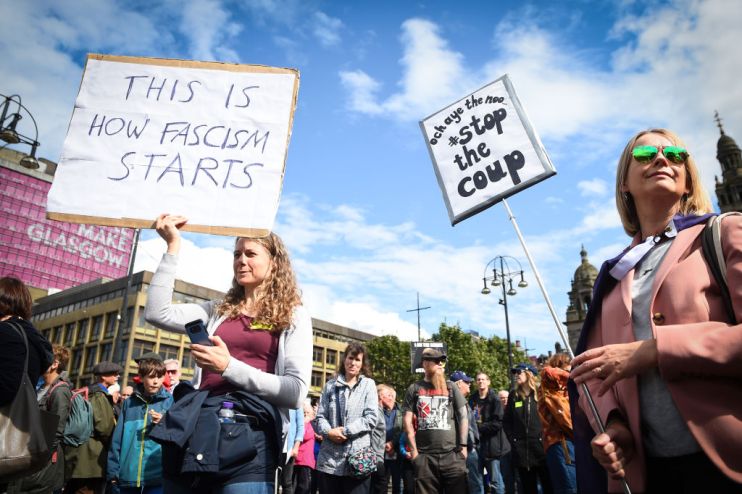This overblown rhetoric about ‘coups’ and ‘Nazism’ is in no one’s interests

“This is Britain’s Reichstag Fire Decree moment.”
That was one man’s reaction to Boris Johnson’s decision last week to prorogue parliament. It’s the kind of intemperate remark you expect in the wilder reaches of social media, where Godwin’s Law – the inevitability of someone bringing up Hitler in an online debate – is alive and well.
To read it in an article from Richard J. Evans, one of our foremost historians of Nazi Germany, was altogether more concerning.
As a world-leading expert on the Third Reich, Evans knows very well that the Reichstag Fire Decree, which suspended a host of civil rights in one fell swoop, bears little resemblance to the British Prime Minister’s decision to suspend parliament for a few days longer than would already have been the case.
This kind of reasoning seems to be catching on. Historian Simon Schama has referred to “Duce Boris” – a nod to Mussolini’s title of choice. The journalist Lionel Barber completed the totalitarian trifecta by tweeting on Sunday that “the Bolsheviks have taken charge”.
Of course, glib comparisons are not limited to pro-Europeans. Certain Brexiteers casually refer to politicians they dislike as “traitors” and seem incapable of discussing contemporary politics without invoking Dunkirk, the Blitz, or D-Day.
Tempers may run high over Brexit, but these kind of jibes are less analysis than a brand of slightly hysterical name-calling. And the returns of this hyperbole diminish pretty rapidly. When someone starts throwing around words like “Nazi” or ‘fascist”, or referring to the EU as the “EUSSR”, it usually signals the end of any sensible discussion.
Similarly, when normally serious people start saying that the UK is in the throes of a “coup” or that Boris has become a “dictator”, there’s a strong temptation to just stop listening. Those who have had the misfortune to experience a real coup or live under an actual dictatorship must find it all pretty astonishing.
The Prime Minister has bent parliamentary procedure to his own advantage, but he’s hardly the first politician to do so. What’s more, his opponents have been willing to use all sorts of chicanery to try to get their way.
Not too long ago, some of those now hollering about an assault on democracy were contemplating installing Ken Clarke or Dominic Grieve as Prime Minister of a so-called “national unity” government made up of entirely anti-Brexit MPs.
And those predicting economic meltdown after a no-deal Brexit may also want to consider the effects of overplaying one’s hand. Claiming that the UK faces an economic apocalypse after Brexit Day risks making anything approaching normality look like a triumph for the government.
But it’s not just the anti-Brexit left who are guilty of falling into the hyperbole trap. The right should be wary too, when it comes to talking about Jeremy Corbyn’s Labour.
However passionately you disagree with the Labour leader, arguing that he secretly wants to turn Britain into Venezuela is liable to perplex most voters, for whom the comparison has little resonance. We are not, after all, an oil-rich South American country with a long and ignominious history of corruption.
And there’s really no need for hyperbolic speculation when you can simply examine the policies that Corbyn has already proposed.
It is not an exaggeration, for example, to say that Labour plans to renationalise swathes of the British economy, with no apparent regard to the implications for either taxpayers or pension funds invested in UK utilities.
The Centre for Policy Studies estimates the extra borrowing that this would entail at £176bn, equivalent to 10 per cent of the national debt. That’s to say nothing of the effects on confidence if a Labour government refuses to pay market value – something John McDonnell hinted at when he said that “parliament will set the price”.
Then there’s the recent analysis from the FT and law firm Clifford Chance, which estimates that McDonnell’s plan to divvy out shares to employees would effectively expropriate around £300bn from the UK’s largest companies.
This kind of focused analysis of what Labour’s policies would actually mean for jobs, investment and household finances is far more likely to hit home than claiming that Corbyn is Islington’s answer to Hugo Chavez.
Often, it seems our reaction to events is shaped more by the particular hate figure involved than the reality of the situation. As with Corbyn, so with the backlash against prorogation, some of which is clearly a facsimile for feelings towards the Prime Minister. I hate Boris, the thinking goes, therefore the thing he’s done must be hateful.
What you could call the “Reichstag Fire tendency” does not just coarsen our discourse, it cheapens it. When so many things are described as a “crisis”, “chaos” or “unprecedented”, it becomes more difficult to judge whether a situation is genuinely worrying, or if it is being overplayed for someone’s gain.
Whatever the political cause, be it campaigning against Brexit or defeating Corbyn, persuading the waverers requires much more than overblown rhetoric.
If you cry wolf, don’t be surprised if it comes back to bite you.
Main image credit: Getty